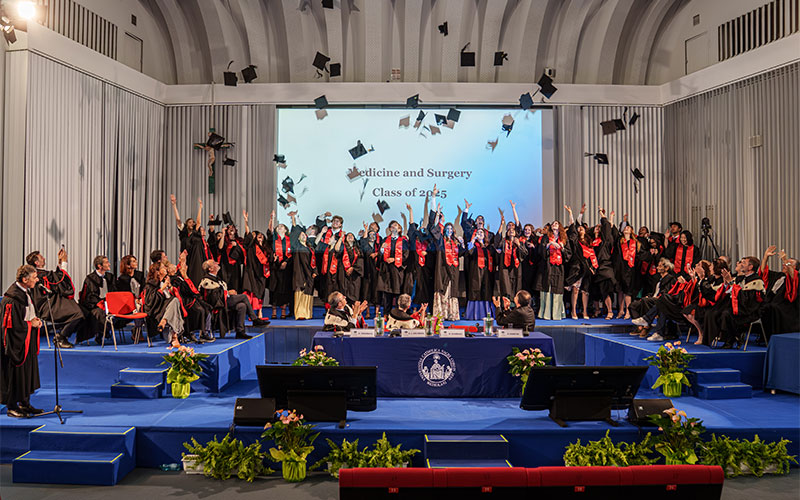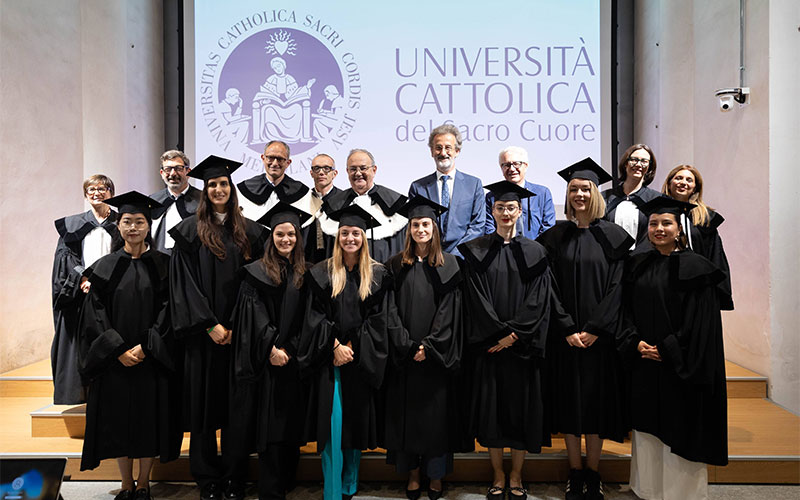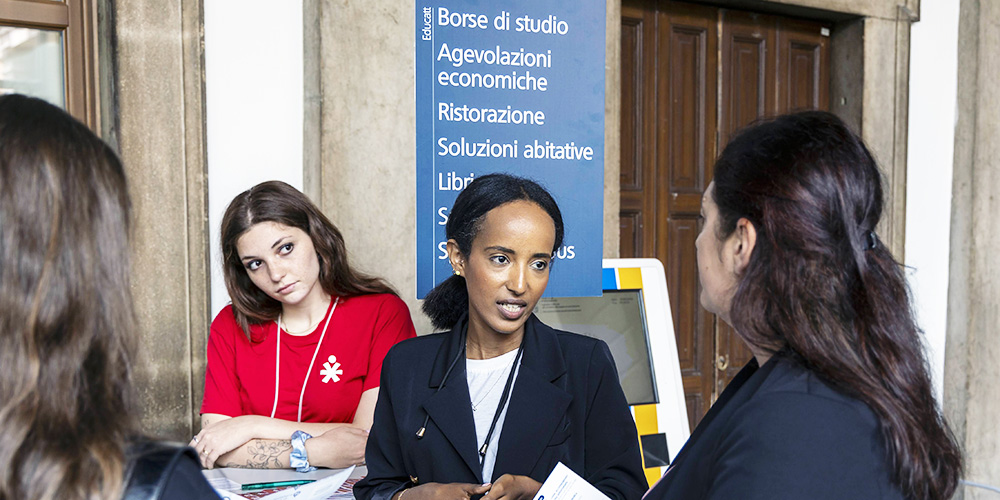 Studiare in Cattolica
Offerta formativa
Esplora tutte le novità dei nostri corsi di laurea triennale, magistrale e a ciclo unico
Studiare in Cattolica
Offerta formativa
Esplora tutte le novità dei nostri corsi di laurea triennale, magistrale e a ciclo unico
Scegli il tuo percorso
In evidenza
Eventi
15 elementi trovati
-
Mostra E L P Ì S - Dove nasce la speranza
Milano - Dal 13 giugno 2025 al 30 settembre 2025 -
Convegno La responsabilità medico-sanitaria tra sistema di tutele in evoluzione e allocazione dei rischi nel mercato assicurativo
Milano - 09 luglio 2025 -
Webinar Magistratura ordinaria - preparazione al concorso
Da remoto - 14 luglio 2025 -
Celebrazione eucaristica Celebrazione Eucaristica
Milano - 15 luglio 2025 -
Presentazione volume Il mestiere dell'antitrust
Milano - 15 luglio 2025 -
Webinar Matematica: modalità di ammissione e Concorso esoneri
Brescia - 16 luglio 2025 -
Ciclo di seminari a.a. 2024/2025 FORmazione MEtodologica (FORME)
Milano - 19 settembre 2025 -
Il Pianoforte in Ateneo Il Pianoforte in Ateneo
Milano - 25 settembre 2025 -
Conferenza IROD 2025 - Open day Radiologia interventistica
Roma - 27 settembre 2025 -
Workshop From light to nano
Brescia - Dal 29 settembre 2025 al 30 settembre 2025 -
Evento Settimana del Dono
Cremona, Piacenza - Dal 06 ottobre 2025 al 10 ottobre 2025 -
Ciclo di seminari a.a. 2024/2025 FORmazione MEtodologica (FORME)
Milano - 09 ottobre 2025 -
Il Pianoforte in Ateneo Il Pianoforte in Ateneo
Milano - 16 ottobre 2025 -
Congresso XXX Congresso Nazionale dei Genetisti Forensi Italiani "NEW DIRECTIONS IN FORENSIC GENETICS"
Roma - Dal 16 ottobre 2025 al 18 ottobre 2025 -
Il Pianoforte in Ateneo Il Pianoforte in Ateneo
Milano - 13 novembre 2025
Succede in ateneo

Roma
Nel segno della pace, del bene comune e della solidarietà Il 27 giugno la comunità dell’Università Cattolica del Sacro Cuore si è riunita nella sede di Roma per la solenne celebrazione del Patrono dell’Ateneo. Gli omaggi al cardinale Peter Kodwo Appiah Turkson e al vicepresidente della Fao Maurizio Martina Info
Roma
Nuovi medici per un mondo migliore La cerimonia di laurea dei nuovi dottori in Medicine and Surgery. Il Commencement Speech della Preside della School of Medicine della Temple University: “La connessione umana, la presenza che guarisce: questa è l'arte della Medicina”
Scienze agrarie, alimentari e ambientali
Il cibo del futuro si studia a Cremona Otto talenti internazionali si diplomano al Master in Innovation in Food Science and Technology – Michele FerreroRicerca
Da Sydney alle Ande per un mondo più giusto Le nuove generazioni al centro del primo Report di Sacru dedicato agli Obiettivi di Sviluppo SostenibileBrescia
L’importanza di ascoltare, prima di "fare" Paola Zini è stata in Mozambico per un intervento di empowerment delle competenze degli insegnanti della scuola dell’infanzia locale. Il progetto è parte Piano Africa della Cattolica e si inserisce nelle attività della Cattedra UnescoMilano
La laurea, una bussola nell’era delle transizioni "Persone & Talenti", la due giorni promossa dal Corriere della Sera sui temi del lavoro, ha messo a confronto gli atenei milanesi sul loro ruolo strategico nella formazione dei giovani. Gli interventi di Anna Maria Fellegara, Claudia Manzi e Ivana PaisPiacenza
Law in Action: lo Sportello Giuridico dell’Università Cattolica. Qui il diritto incontra la realtà Esperienza sul campo, impegno civile, formazione integrata. Alla Cattolica il futuro giurista si costruisce (anche) così. Una concreta attività di Service Learning, nel quadro della Terza missione universitaria
europa
L’Università Cattolica incontra le istituzioni europee: il riassunto della giornata Elena Beccalli, Luciano Fontana
europa
Europa: domande aperte per un futuro comune. Rivivi l’Evento in Aula Magna Elena Beccalli, Luciano Fontana
giubileo
Sperare contro ogni speranza: il coraggio del dialogo dopo il terrorismo Georges Salines, Azdyne Amimour
giubileo, psicologia
Cultivating hope: from theoretical models to interventions Alessandro Antonietti, Anthony Scioli
demografia, lavoro
Italia 2050 Che paese sarà l’Italia nel 2050? È possibile oggi capire che strada prendere per governare i cambiamenti in atto? Per governare l'incertezza del futuro bisogna evitare di semplificare problemi complessi. Dobbiamo pensare a lungo termine, considerare tutte le variabili in gioco e creare una rete globale di conoscenza. A cura di Marzio Mian e Nicola Scevola 5 episodi
inclusione
Tutti inclusi Un viaggio tra le voci dell’Università per esplorare gli effetti dell’intelligenza artificiale nella nostra vita. Perchè i robot sono già qui con noi. O forse contro di noi. Alleati dell’uomo o nemici dell’umanità? Massima espressione di intelligenza oppure d’incoscienza? 5 episodi
migranti
Sconfinati L’onda dei profughi in fuga dalla guerra in Ucraina sconvolge l’Europa e impone di aggiornare il dibattito sugli esodi e l’accoglienza, fenomeni che da decenni dividono le coscienze e la politica del Vecchio Continente. Le voci-guida sono quelle degli esperti dell'Ateneo, integrate da testimonianze nazionali e internazionali di primo piano. Una serie podcast in cinque puntate dell'Università Cattolica a cura Marzio Mian e Nicola Scevola, pubblicata su Avvenire 5 episodi
migranti, politica estera
2025, andata o ritorno Una serie di Avvenire realizzata in collaborazione con l’Università Cattolica, che trae spunto dai grandi temi emersi alla Settimana sociale dei Cattolici italiani di Trieste. Cinque puntate per cinque dimensioni chiave di un anno, il prossimo, che si preannuncia come un sottile e delicato crinale. 5 episodi
media
Io sono la radio Una serie a cura degli studenti del Master Fare Radio dell'Università Cattolica del Sacro Cuore 5 episodi
letteratura, pedagogia
Ritratti di un tempo Ci sono personaggi che segnano un’epoca. Alcuni di fama indiscussa sono diventati miti o “leggende”, altri meno noti alle grandi platee sono riconosciuti perché hanno contribuito a una scoperta scientifica, hanno vinto un Premio Nobel, o hanno avuto una vita spiritualmente esemplare, o sono diventati un’icona del loro tempo in campo letterario, artistico, musicale. Attraverso queste donne e questi uomini, prende forma di volta in volta un periodo storico, una generazione, una cultura. Affidiamo questi ritratti ai docenti dell’Università Cattolica del Sacro Cuore per ascoltare racconti, aneddoti, interpretazioni e lasciarsi trasportare da provocazioni e suggestioni. 11 episodi
sociologia
Padri e Madri della Sociologia Racconti, aneddoti e storie di chi ha formato le idee sulla società. Li raccontano in questa serie podcast le autrici e gli autori che hanno contribuito alla stesura del manuale di Sociologia generale (Vita e Pensiero, 2022) curato da Rita Bichi 7 episodi















